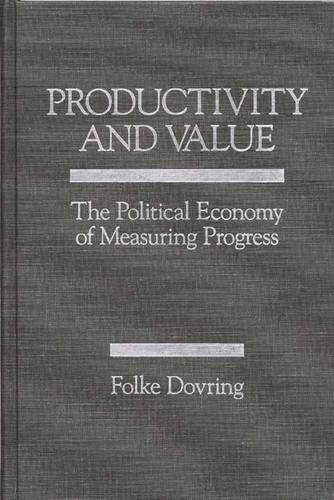
Productivity and Value: The Political Economy of Measuring Progress
(Hardback)
Publishing Details
Productivity and Value: The Political Economy of Measuring Progress
Bloomsbury Publishing PLC
Praeger Publishers Inc
21st May 1987
United States
Classifications
Tertiary Education
Non Fiction
338.060973
Physical Properties
Hardback
201
Description
Productivity and Value takes a critical look at the generic concepts of productivity as they are used in most of the conventional literature. In this compelling book, the author challenges the concept of total-factor productivity as a valid indicator of successes or failures in economic policy and in the economy generally. Unique to this book is the consistent distinction made between economic and physical expressions. The author examines the difficulties when physical and economic measures are mixed. Instead, he proposes that productivity, as a measure of progress in production, should be limited to single-factor of key commodities, such as land, labor, energy, and capital. Such a measure, he claims, will be more realistic and will also come closer to being understood by the public.
Reviews
Dovring presents a comprehensive survey of the various meanings of productivity.' The term has been inappropriately used many a time, leading to confusion. Depending upon the context in which the term is being used, it assumes completely different meanings. Besides productivity of a single factor like land, labor, or energy, economists have devised the concept of total factor productivity'--a composite measure of productivity of all factors of production. No single volume previously published has done justice to this topic. The issues are discussed in a nontechnical manner, making the work accessible to general readers. Extensive and up-to-date bibliography at the end of the book is useful for further study and research on the subject. Highly recommended for undergraduate/graduate collections in the social sciences.-Choice
"Dovring presents a comprehensive survey of the various meanings of productivity.' The term has been inappropriately used many a time, leading to confusion. Depending upon the context in which the term is being used, it assumes completely different meanings. Besides productivity of a single factor like land, labor, or energy, economists have devised the concept of total factor productivity'--a composite measure of productivity of all factors of production. No single volume previously published has done justice to this topic. The issues are discussed in a nontechnical manner, making the work accessible to general readers. Extensive and up-to-date bibliography at the end of the book is useful for further study and research on the subject. Highly recommended for undergraduate/graduate collections in the social sciences."-Choice
Author Bio
FOLKE DOVRING was a consultant for the U.S. Department of Agriculture and Professor of Land Economics at the University of Illinois at Urbana-Champaign.
